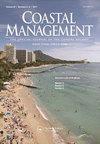Seabed Mining within National Jurisdiction: An Assessment of the Relevant Legislation of the Cook Islands
IF 1.9
4区 环境科学与生态学
Q4 ENVIRONMENTAL SCIENCES
引用次数: 3
Abstract
Abstract Beyond the boundaries of national jurisdiction, the seabed and its mineral resources are governed by a comprehensive international regime, which determines by whom and under what conditions these natural resources can be exploited. However, the same mineral resources that deep sea mining actors are keen to exploit in the Area, are also available within zones falling under the exclusive jurisdiction of coastal states. So even if strict rules and precise standards would be enforced with regard to seabed mining operations in the Area, similar activities within a coastal state’s national jurisdiction remain unchecked by international law. Therefore, the question can be raised whether this might lead to substandard exploitation of the minerals of the seabed without adequate supervision? This article tests this assumption in a detailed case study of the relevant legislation of the Cook Islands, comprising the 2017 Marae Moana Act and the 2019 Cook Islands Seabed Minerals Act. Following a concise analysis of the competences of coastal states on their continental shelf, the domestic laws of the Cook Islands are critically compared with the international legal framework governing the Area, to assess whether they contain equivalent rules, mechanisms and safeguards.国家管辖范围内的海底采矿:对库克群岛相关立法的评估
摘要在国家管辖范围之外,海底及其矿产资源由一个全面的国际制度管理,该制度决定了由谁以及在什么条件下开采这些自然资源。然而,深海采矿行为者热衷于在“区域”开采的相同矿产资源,也可在沿海国专属管辖区内获得。因此,即使对“区域”内的海底采矿作业实施严格的规则和精确的标准,沿海国国家管辖范围内的类似活动仍不受国际法的约束。因此,可以提出这样一个问题:这是否会导致在没有充分监督的情况下对海底矿物进行不合标准的开采?本文在库克群岛相关立法的详细案例研究中检验了这一假设,该立法包括2017年《马拉伊-莫阿纳法》和2019年《库克群岛海底矿产法》。在简要分析了沿海国在其大陆架上的权限后,将库克群岛的国内法与管辖“区域”的国际法律框架进行了严格比较,以评估其是否包含同等的规则、机制和保障措施。
本文章由计算机程序翻译,如有差异,请以英文原文为准。
求助全文
约1分钟内获得全文
求助全文
来源期刊

Coastal Management
环境科学-环境科学
CiteScore
6.00
自引率
0.00%
发文量
24
审稿时长
>36 weeks
期刊介绍:
Coastal Management is an international peer-reviewed, applied research journal dedicated to exploring the technical, applied ecological, legal, political, social, and policy issues relating to the use of coastal and ocean resources and environments on a global scale. The journal presents timely information on management tools and techniques as well as recent findings from research and analysis that bear directly on management and policy. Findings must be grounded in the current peer reviewed literature and relevant studies. Articles must contain a clear and relevant management component. Preference is given to studies of interest to an international readership, but case studies are accepted if conclusions are derived from acceptable evaluative methods, reference to comparable cases, and related to peer reviewed studies.
 求助内容:
求助内容: 应助结果提醒方式:
应助结果提醒方式:


